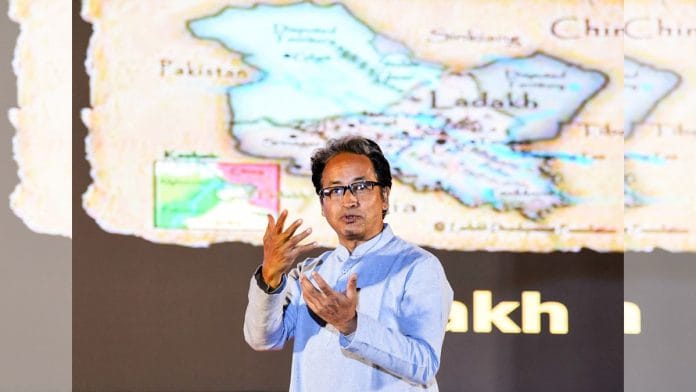New Delhi: Climate activist and education reformer Sonam Wangchuk is among the prominent Ladakhi voices, terming the recently notified policies on domiciles, job reservations, the composition of hill councils, and the official languages of the Union Territory as “only a partial resolution”.
The central government on Tuesday released a notification, reserving 85% of all government jobs in Ladakh for locals, and a third of all seats in the hill councils for women on a rotational basis.
Speaking to ThePrint, Sonam Wangchuk said the notification addressed only “the third and least important” of the core demands of Ladakhis, adding that if the Centre now stopped, it would be a “serious breach of trust”.
“This is not a resolution of Ladakhi issues. It is only a partial resolution of the third and least important of our demands—youth employment. The core demands of statehood and the Sixth Schedule protections have not even come up for discussions yet.”
“People are confused and anxious, fearing the Centre would project the job reservations as the final solution. If that happens, it will be a serious breach of trust,” Sonam Wangchuk said. “The Centre earlier assured us of taking only the first step towards resolving urgent issues now. If the notification is the only step, it, for sure, does not address the main demands, and the people of Ladakh will, in that case, feel cheated.”
Speaking to ThePrint, Cherring Dorjay Lakruk, the president of Ladakh Buddhist Association and co-convener of Leh Apex Body, said, “It is the best we could negotiate with the Centre for now. It met one of our key demands—85% job reservation for Ladakhis. But there is still confusion among people, which is why they are not celebrating yet.”
“Many wrongly believe that STs (Scheduled Tribes) from outside can claim benefits. We will hold a press conference to clear that up,” he added.
On the other hand, calling the notification a “welcome move”, members of different hill councils said that the discussions on the remaining demands would take place at some later point.
The notification also restricted the children of central government employees from becoming Ladakh “domiciles” until they proved they had continuously lived in Ladakh for 15 years, starting 31 October 2019, or the day Ladakh became a UT. It also declared English, Hindi, Urdu, Bhoti, and Purgi as the UT’s official languages.
Also Read: Shivaji statue in Ladakh is part of an unfortunate trend. Indian Army must introspect
Ladakhis wait & watch
The Centre’s notification, of course, is not all bad. It, after all, is the wind beneath the wings of the youth awaiting government action for a long time.
“The announcement brings relief for unemployed youth and understaffed departments, but even that is only partial,” Sonam Wangchuk said. “We were hoping for a 30-year domicile cut-off, not 15 years, as notified all of a sudden.”
According to Sonam Wangchuk, people are still willing to place trust in the Centre, but only if it keeps the promises of providing full democratic rights to Ladakhis and implementing the Sixth Schedule in the region, providing special provisions for the administration of the tribal areas.
Sonam Wangchuk said that Ladakh’s statehood and the Sixth Schedule protections were the top agendas in the BJP manifesto released before the 2020 elections to the hill councils in Ladakh—demands, so far, unfulfilled.
Now, elections are again approaching, and if the BJP meets the two main demands before polling, all parties might withdraw from contesting.
Sonam Wangchuk said that in the September elections, people would hand the hill councils over to the Centre on a platter if it sincerely addressed their main demands. “Parties are saying the government can win—uncontested—in that case,” Sonam Wangchuk said.
“However, if the discussion ends with domicile, it will not be enough for the leadership or the people. In case the Centre sincerely pursues discussions on security and democracy, Ladakh will forever be grateful,” he added.
How Ladakhis will eventually feel about the central government depends on what will happen next—the public is “expecting real talks” to begin soon.
“If the real talks begin now, this is a welcome start. If not, people will respond through the next elections,” Sonam Wangchuk warned.
(Edited by Madhurita Goswami)
Also Read: Who was Tsetan Namgyal, ‘unsung hero’ who served with the Indian Army in the 1962 war







The Sixth Schedule of the Constitution is meant for the protection of indigenous people of north-east India. Ladakh has got nothing to do with the Sixth Schedule. The founding fathers of the nation never intended the Sixth Schedule to be enforced on any other region in India with the exception of the north-east.
Mr. Sonam Wangchuk should study the debates and discussions of the Constituent Assembly.
Besides, who do the Ladakhis need “protection” from? Do they consider Indian citizens hailing from other states as threats? Do they look upon non-Ladakhis as unwanted outsiders?
Shame on Mr. Wangchuk and his supporters!